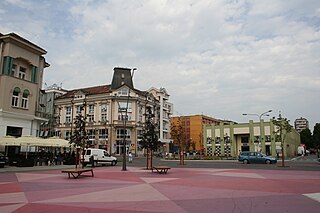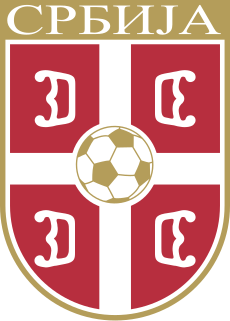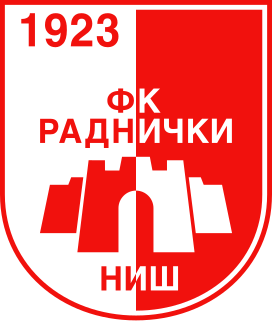
Šabac is a city and the administrative centre of the Mačva District in western Serbia. The traditional centre of the fertile Mačva region, Šabac is located on the right banks of the river Sava. According to the 2011 census, the city proper has population of 53,919, while its administrative area comprises 118,347 inhabitants.

Bačka Palanka is a town and municipality located in the South Bačka District of the autonomous province of Vojvodina, Serbia. It is situated on the left bank of the Danube. In 2011 the town had a total population of 28,239, while Bačka Palanka municipality had 55,528 inhabitants.

The Socialist Federal Republic of Yugoslavia, commonly referred to as SFR Yugoslavia or simply Yugoslavia, was a country in Southeast and Central Europe that existed from its foundation in the aftermath of World War II until its dissolution in 1992 amid the Yugoslav Wars. Covering an area of 255,804 km2, the SFRY was bordered by the Adriatic Sea and Italy to the west, Austria and Hungary to the north, Bulgaria and Romania to the east, and Albania and Greece to the south. The nation was a socialist state and a federation governed by the League of Communists of Yugoslavia and made up of six socialist republics – Bosnia and Herzegovina, Croatia, Macedonia, Montenegro, Serbia, and Slovenia – with Belgrade as its capital. In addition, it included two autonomous provinces within Serbia: Kosovo and Vojvodina. The SFRY's origin is traced to 26 November 1942, when the Anti-Fascist Council for the National Liberation of Yugoslavia was formed during World War II.

The Serbia national football team represents Serbia in men's international football competition. It is controlled by the Football Association of Serbia, the governing body for football in Serbia.

Fudbalski klub Radnički, commonly known as Radnički Niš, is a professional football club based in Niš, Serbia. Its name means Labourers in Serbian and stems from the relationship with the Labour movement which the club had during the first half of the 20th century.
The 1946–47 Yugoslav First League season was the first season of the First Federal League, the top level association football competition of SFR Yugoslavia, which ended the six-year period in which national football competitions were suspended due to World War II. It was also the first season in which the Football Association of Yugoslavia (FSJ) introduced the modern league system which included promotion and relegation between tiers of the football pyramid, as pre-war national championships held between 1927 and 1940 during Kingdom of Yugoslavia employed either a play-off tournament or a mini league format contested by regional champions.

HŠK Građanski, also known as 1. HŠK Građanski or fully Prvi hrvatski građanski športski klub, was a Croatian football club established in Zagreb in 1911 and dissolved in 1945. The club had a huge influence on the development of football in Croatia and Kingdom of Yugoslavia and achieved its greatest success in the period between the two World Wars.

The Croatia national handball team represents Croatia in international men's team handball competitions and friendly matches. The handball team is controlled by the Croatian Handball Federation.

HAŠK(full name Hrvatski akademski športski klub, English: Croatian Academic Sports Club) was a Croatian football club established in Zagreb in 1903 which ceased operating in 1945. The club was one of the most successful sides in Zagreb and the Kingdom of Yugoslavia in the period between the two World Wars. Since then several sports clubs have claimed to descend from it, the most significant of which is HAŠK Mladost sports society.
Handball Federation of Bosnia and Herzegovina is the highest Handball governing body in the country. It organizes the Handball Championship of Bosnia and Herzegovina and Handball Cup of Bosnia and Herzegovina.

Sport in Europe tends to be highly organized with many sports having professional leagues. The origins of many of the world's most popular sports today lie in the codification of many traditional games, especially in Great Britain. However, a paradoxical feature of European sport is the remarkable extent to which local, regional and national variations continue to exist, and even in some instances to predominate.

Football is the most popular sport in Serbia. The Football Association of Serbia (FSS) is the national governing body and is responsible for overseeing all aspects of the game of football in the country, both professional and amateur. The association organizes the professional Serbian Superliga and is responsible for appointing the management of the men's, women's and youth national football teams in Serbia. The association also organizes the Serbian First League (second) and Serbian League (third), operating the top 3 leagues.
FK Železničar is a football club based in Lajkovac, Serbia.
Ivan Snoj was a Croatian team handball coach and international referee, international sports official, journalist and publicist. By profession he was gym teacher.
Sport in Kosovo has a long tradition and plays a prominent role in the society. Popular sports in Kosovo are among others football, basketball, volleyball, handball, and rugby. Whereas, major individual sports include wrestling, judo, swimming, boxing, karate and skiing.
The sport of ice hockey has been played in Croatia at least since the late 19th century. It became organised on the national level in 1935 with the establishment of the Croatian Ice Hockey Federation, and at this period Croatian teams were playing in the Yugoslav Ice Hockey League. During the 1960s, Group B of the 1966 World Ice Hockey Championships took place in Zagreb, and KHL Medveščak Zagreb became a leading team, winning the national championship on several occasions. The breakup of Yugoslavia in 1991 led to the formation of the Croatian Ice Hockey League.

Ljubodrag "Duci" Simonović ; born 1 January 1949) is a Serbian philosopher, author and retired basketball player.

Czech handball is an outdoor ball game which was created in 1905 in Prague and is still played today. This sport is very similar to team handball.
Football in Yugoslavia had different levels of historical development depending on the geographical regions. Following the extreme popularity of the sport in Central Europe, it soon became the most popular sport in the territories of Yugoslavia as well.
Lujo Györy was a Croatian handball player, referee and official.











